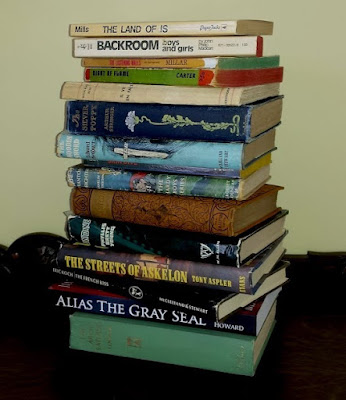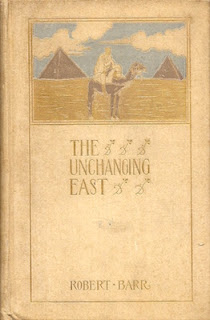 The Passionate Invaders
The Passionate InvadersJohn Clare
New York: Doubleday, 1965
Had it not been for the nineteenth-century English poet John Clare, I doubt that I would've noticed this novel, found several weeks ago in a London thrift store. The Canadian John Clare meant nothing to me, though he did once serve as editor for a number of Toronto-based periodicals. Here he is in a 1948 advert for Maclean's:


The Ottawa Citizen, 18 February 1948
Just how well Clare practiced his precepts in the short story format I cannot say – there is no collection – but this, his first and only novel, is a great disappointment. Here I admit that I was hoping for another forgotten, entertaining satire like
The Chartered Libertine by Ralph Allen (top row, first from the left). Instead, what I encountered was a slight, self-indulgent work. Oh, but the cover held such promise!
All centres on Magnus Dillon, a wise-cracking Toronto magazine editor who is assigned to track down "The Snainef", a group of Canadian terrorists intent on invading the United States. Truth be told, he barely tries. Despite great pressure from his boss, Dillon spends most of his time drinking and thinking about the past.
There's no suspense in this "SATIRIC, RICHLY COMIC SUSPENSE NOVEL"; the author doesn't want us on the edge of our seats, he'd rather we sit back as he recounts the boyish pranks Dillon pulled during his stint in the RCAF. (Clare served as a flight lieutenant during the Second World War.) There's also a lengthy history of our hero's favourite watering hole, an inconsequential four-page letter from a friend, and Dillon's rather dry attempts to explain Canada and Canadians to any and all Americans he encounters. The greater part of The Passionate Invaders passes before protagonist and reader so much as encounter the Snainef.
Throughout it all, the prose coughs, sputters and chokes. Witness the beginning of chapter two:
Gus had driven half the distance from his office to the Carfleet house (he was going to meet his wife at the party – she was diving out with a friend), when it occurred to him that Charlie Carfleet might well be a likely suspect after all.
The author told Scott Young (top row, second from the right) that Doubleday accepted his novel "on sight". Clare further claimed that the publisher asked for no changes: "They didn't lay a glove on it."
Shame, really.
An aside: I can't help but feel that the folks down in New York were hoping for a success along the lines of Leonard Wibberley's The Mouse that Roared and its many spinoffs.

Trivia: The Passionate Invaders cover art is by the late Eldon Dedini, best remembered for his New Yorker and Playboy cartoons.

Object and Access: Found in public libraries across the United States, though only that belonging to the City of Toronto serves north of the border. Rob Ford might just put an end to that. Those looking to purchase this, the first and only edition, will find that Very Good copies start at US$8. Two booksellers from an alternate universe are asking US$75 and US$99 respectively.































